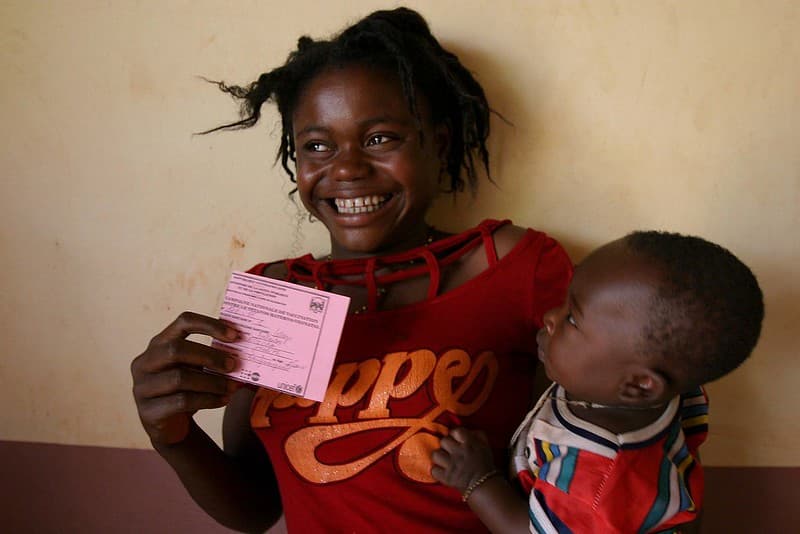Information Management Specialist, (P3), (Temporary Appointment -Open to non Sudanese) Port Sudan, Sudan
Port Sudan
- Organization: UNICEF - United Nations Children’s Fund
- Location: Port Sudan
- Grade: Mid level - P-3, International Professional - Internationally recruited position
-
Occupational Groups:
- Statistics
- Information Technology and Computer Science
- Documentation and Information Management
- Closing Date: 2024-02-02
Given the scale and the impact of the ongoing conflict, there are greater and urgent demands for data, information and analysis in the CP AOR. Parallel to the recent conflicts, Sudan communities are simultaneously hit with an on-going climate related events including heavy rain and floods. The humanitarian response requires high Information Management (IM) capacity with the operationalization of the inter-agency approach. The IM Specialist will support the CP AoR to make informed evidence based strategic decisions at the field level on: i) the scale/scope and coverage by the child protection partners; ii) responses to the ongoing crisis, as necessary; iii) the needs of affected populations; iv) prioritization of areas according to cluster indicators, as specified in the Flash Updates and Flash Appeal as well as the Humanitarian Response Plan (HRP); v) what the key gaps in needs and response are; and vi) what capacity (human, material, financial) is required. The Sudan-CPAoR IM Specialist will provide technical guidance to the CP AoR and UNICEF programming partners. She/he will contribute towards generating an overall emergency situation analysis and response coverage in the area of child protection. The IM Specialist will ensure consistent capacity strengthening of the CP AoR and UNICEF programming to obtain timely and accurate information about the needs, plans and crisis response.
UNICEF works in some of the world’s toughest places, to reach the world’s most disadvantaged children. To save their lives. To defend their rights. To help them fulfill their potential.
Across 190 countries and territories, we work for every child, everywhere, every day, to build a better world for everyone.
And we never give up.
For every child, www.unicef.org/sudan
Sudan, surrounded by the Central African Republic, Chad, Egypt, Ethiopia, Eritrea, Libya and South Sudan, positioned next to East, West, South and North Africa, is surrounded by complex conflicts in an unpredictable, volatile and rapidly evolving region. Sudan is by size the third biggest country in Africa, with a diverse population of around 42 million people. Sudan’s children make up half of the total population, and the past two decades have seen their lives significantly improve: fewer girls and boys are dying before their fifth birthday, primary school attendance is increasing, immunization coverage is high and the country remains polio free. Still, millions of children continue to suffer from protracted conflict in Darfur, the Kordofan’s, and Blue Nile, from seasonal natural disasters, malnutrition and disease outbreaks, and from under-investment in basic social services. More than three million of Sudan’s school aged children are not in the classroom. UNICEF has been in Sudan since 1952 and continues with a presence in 12 of Sudan’s 18 states.
The fundamental mission of UNICEF is to promote the rights of every child, everywhere, in everything the organization does — in programs, in advocacy and in operations. The equity strategy, emphasizing the most disadvantaged and excluded children and families, translates this commitment to children’s rights into action. For UNICEF, equity means that all children have an opportunity to survive, develop and reach their full potential, without discrimination, bias or favoritism. To the degree that any child has an unequal chance in life in its social, political, economic, civic and cultural dimensions — her or his rights are violated. There is growing evidence that investing in the health, education and protection of a society’s most disadvantaged citizens — addressing inequity — not only will give all children the opportunity to fulfill their potential but also will lead to sustained growth and stability of countries. Therefore, the focus on equity is so vital. It accelerates progress towards realizing the human rights of all children, which is the universal mandate of UNICEF, as outlined by the Convention on the Rights of the Child, while also supporting the equitable development of nations.
How can you make a difference?
Given the scale and the impact of the ongoing conflict, there are greater and urgent demands for data, information and analysis in the CP AOR. Parallel to the recent conflicts, Sudan communities are simultaneously hit with an on-going climate related events including heavy rain and floods. The humanitarian response requires high Information Management (IM) capacity with the operationalization of the inter-agency approach. The IM Specialist will support the CP AoR to make informed evidence based strategic decisions at the field level on: i) the scale/scope and coverage by the child protection partners; ii) responses to the ongoing crisis, as necessary; iii) the needs of affected populations; iv) prioritization of areas according to cluster indicators, as specified in the Flash Updates and Flash Appeal as well as the Humanitarian Response Plan (HRP); v) what the key gaps in needs and response are; and vi) what capacity (human, material, financial) is required.
The Sudan-CPAoR IM Specialist will provide technical guidance to the CP AoR and UNICEF programming partners. She/he will contribute towards generating an overall emergency situation analysis and response coverage in the area of child protection. The IM Specialist will ensure consistent capacity strengthening of the CP AoR and UNICEF programming to obtain timely and accurate information about the needs, plans and crisis response.
. Key function, accountabilities, and related duties/tasks
- Information Management for the CP AOR in the coordination structure:
- Lead gap analyses at Sudan level for the CP AOR based upon agreed data sources, including through verification and support for information disaggregated by age and sex, vulnerable groups and severity scale locations.
- Lead the development and regular revision of UNICEF and Inter-Agency Information Management tools related to the CP AOR.
- Coordinate closely with other IMOs belonging to the protection cluster and other clusters located either remotely or in person, and ensure complementarity, harmonization and compatibility in the collection of information, format and the products that are used.
- Always ensure the security of data and observe the Information Sharing and Confidentiality Protocols.
- Contribute to UNICEF and Inter-Agency Information Management discussions including for data collection, quality assurance and clearance prior to dissemination, at field level as necessary.
- Represent the CP AOR in the Inter-Cluster Coordination Group IMOs activities and Support field level coordination functions as requested by the Coordinators.
- Data Collection, Compilation and Analysis
- Provide continuous support to the child protection monitoring working group and generate regular information products highlighting the humanitarian situation and current needs to support decision making, advocacy and resource mobilization efforts.
- Lead the data collection and reporting from partners in the emergency response tool and generate comprehensive documents in a way that is easily understood by various decision makers (maps, dashboards, infographics and resource analyses).
- Undertake Mapping including 4Ws/5Ws, Needs and Gaps analysis, Services and Infrastructure at field level, as required.
- Support inter-cluster efforts in generating Cross Sectoral Assessment Needs, Service Mapping, Rapid Assessments, Sitreps and Situation Analysis.
- Lead and maintain the suspension and relocation tool in coordination with the Protection cluster IMO.
- Strengthen Child Protection Cluster members capacity in data collection, monitoring, reporting and analysis.
Perform any other IM related activity as might arise.
For the full job description view the link below:
To qualify as an advocate for every child you will have…
Education:
-
Master’s degree or relevant combination of qualifications and experience, in information management or associated disciplines (computer sciences, geography/GIS, engineering, sciences).
Advanced knowledge of Excel, Access, Oracle and MySQL database applications as well as GIS (ArcGIS, QGIS, Google earth Pro. Basic Java and VB scripting) and social media management is an asset
Experience : -
Five (5) years of relevant experience in Information Management, GIS, data analysis or similar activities in humanitarian context. Experience in Sudan response or similar context is an asset.
Experience in conveying technical information and managing information and presenting in form of maps, useable matrices, as needed. Experience in facilitating training is an asset.
Language Requirements: -
Fluency in English is required. Knowledge of other languages is considered an asset, particularly the language of the duty station (Arabic).
-
Core Values
- Care
- Respect
- Integrity
- Trust
- Accountability
- Sustainability
-
Core Competencies
· Demonstrates Self Awareness and Ethical Awareness (1)
· Works Collaboratively with Others (1)
· Builds and Maintains Partnerships (1)
· Innovates and Embraces Change (1)
· Thinks and Acts Strategically (1)
· Drives to Achieve Impactful Results (1)
· Manages Ambiguity and Complexity (1)
Technical competences
- Leading and Supervising
- Formulating Strategies and Concepts
- Analyzing
- Relating and Networking
- Deciding and Initiating Action
- Applying Technical Expertise
- Planning and Organizing
During the recruitment process, we test candidates following the competency framework. Familiarize yourself with our competency framework and its different levels: competency framework here.
Remarks:
UNICEF is here to serve the world’s most disadvantaged children and our global workforce must reflect the diversity of those children. The UNICEF family is committed to include everyone, irrespective of their race/ethnicity, age, disability, gender identity, sexual orientation, religion, nationality, socio-economic background, or any other personal characteristic.
We offer a wide range of benefits to our staff, including paid parental leave, breastfeeding breaks and reasonable accommodation for persons with disabilities. UNICEF strongly encourages the use of flexible working arrangements.
UNICEF has a zero-tolerance policy on conduct that is incompatible with the aims and objectives of the United Nations and UNICEF, including sexual exploitation and abuse, sexual harassment, abuse of authority and discrimination. UNICEF is committed to promote the protection and safeguarding of all children. All selected candidates will, therefore, undergo rigorous reference and background checks, and will be expected to adhere to these standards and principles. Background checks will include the verification of academic credential(s) and employment history. Selected candidates may be required to provide additional information to conduct a background check.
UNICEF’s active commitment towards diversity and inclusion is critical to deliver the best results for children. For this position, eligible and suitable female candidates and profiles from industrial countries are strongly encouraged to apply.
UNICEF only considers higher educational qualifications obtained from an institution accredited/recognized in the World Higher Education Database (WHED), a list updated by the International Association of Universities (IAU) / United Nations Educational, Scientific and Cultural Organization (UNESCO). The list can be accessed at http://www.whed.net/
Only shortlisted candidates will be contacted and advance to the next stage of the selection process.
UNICEF appointments are subject to medical clearance. Issuance of a visa by the host country of the duty station, which will be facilitated by UNICEF, is required for IP positions. Appointments are also subject to inoculation (vaccination) requirements, including against SARS-CoV-2 (Covid). Government employees that are considered for employment with UNICEF are normally required to resign from their government before taking up an assignment with UNICEF. UNICEF reserves the right to withdraw an offer of appointment, without compensation, if a visa or medical clearance is not obtained, or necessary inoculation requirements are not met, within a reasonable period for any reason.








